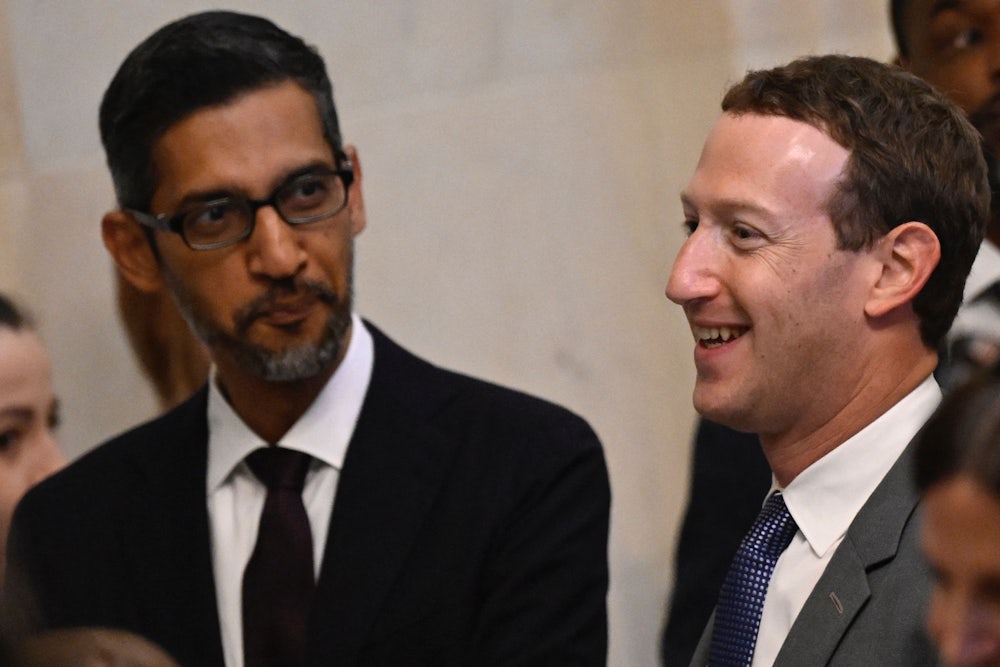On July 31, a federal court of appeals upheld Epic Games’s antitrust win over Google for monopolizing the distribution of Android apps and payment processing within apps like Fortnite. This is just the latest legal triumph against Big Tech corporations. In the past year, the U.S. government scored two major victories against Google, successfully challenging the company’s illegal domination of online search and digital advertising tools.
Now Judges Amit Mehta and Leonie Brinkema are deciding how to fix these monopolized markets, and they could order Google to sell off the Chrome browser, the ad platform DoubleClick, and other lines of business. The Federal Trade Commission could soon add to the win tally in the antitrust case against Meta, in which the FTC asked Judge James Boasberg to consider ordering the divestiture of Instagram and WhatsApp.
Yet, even as they may break the long-standing monopolies of Google and Meta and open important digital markets to rivals, these lawsuits leave the harmful business model of the companies largely untouched. These corporations will still make money by tracking our online and offline activities: They will use fine-grained personal portraits that they have developed and continuously refine to serve up “targeted” content. This surveillance advertising, now intensified by artificial intelligence, violates our privacy, fuels discrimination, keeps us addicted to our devices, and wastes energy, water, and highly skilled labor. Curtailing this business model should be the next front in the campaign against Big Tech.
Surveillance advertising is the lifeblood of today’s internet. Firms big and small track us systematically. Google knows the contents of our emails through Gmail; our wants, interests, and needs through search; and where we met a friend for dinner through its maps used to get directions to the restaurant. Relying on a somewhat different set of tools, Meta gathers a great deal of information about us, as well. Countless other firms surveil us too and, in the words of the Electronic Privacy Information Center, “aggregate and sell personal information at industrial scale.” They monitor us not out of curiosity or voyeurism but primarily to aim to understand our needs, wants, and aspirations at each moment, whether it is running shoes, romance, or something else.
For all the hype around AI, many of the leading companies of the digital era are built on the business of advertising. At root, their principal pitch is helping marketers—businesses, political candidates, and foreign states—reach and influence their target audience with greater precision and effectiveness than through alternative channels like billboards, radio, and television. There are at least four big problems with this model.
First, commercial surveillance infringes fundamental conceptions of privacy. Corporations know our intimate thoughts and comings and goings and may know more about us than our partners do. Given the dominance of Google and Meta and the ubiquity of surveillance advertising, our acceptance of this permanent panopticon is hardly voluntary. Because of design choices made by digital firms, opting out hinders our ability to browse the internet, communicate with family and friends, and participate in public discussions. Being a full-fledged member of society in 2025 requires assenting to corporate surveillance, but this acquiescence should not be mistaken for consent.
Second, the business model can facilitate large-scale illicit discrimination. While digital corporations are fond of touting personalization, this is just another word for discrimination, which is sometimes innocuous, such as a movie theater offering discounted tickets for seniors, but at other times pernicious and illegal—employers refusing to consider minority candidates, for example. In 2022, the Department of Justice entered a settlement with Meta under which it agreed to stop allowing landlords to target prospective tenants based on traits such as race, color, and gender in violation of the Fair Housing Act.
Digital corporations that bar the express targeting of content based on categories such as race and gender can still allow discrimination in effect. As researchers at the Consumer Federation of America wrote: “Even if advertisers are prohibited from using an individual’s status in a protected group directly, an advertiser can use a proxy such as location to exclude protected groups.” Accordingly, under systems of surveillance advertising, whites and men are more likely to see certain job and housing openings than people of color and women are.
Third, surveillance advertising fuels the creation, dissemination, and promotion of addictive content. Like a local broadcaster, Google and Meta value eyeballs and want us to spend more time on their sites. But they also want us engaged so they can learn more about us. An extra hour on YouTube or Facebook means both selling ads and collecting data to perfect the corporations’ personal dossiers on each of us. This dual motive differentiates surveillance-based advertising from traditional marketing through outlets such as newspapers and television.
Fourth, this model consumes huge quantities of resources—a problem that the recent explosive growth of AI has only compounded. Google, Meta, and other digital firms store and process huge quantities of user data and run millions of auctions each second to sell every nook and cranny of their sites to advertisers—not merely one auction for each page at each point in time but one auction for each page at each point in time for each unique visitor. On the same site at the same moment, the marketing content a retired Asian American doctor sees will likely be very different from what a white college freshman gets. These ad machines require huge quantities of electricity, and the Big Tech data center owners, for all their green P.R., will take it from any source, clean or not. Surveilling users and selling us ads also means individual devices use more energy than they would otherwise. The energy requirements of Big Tech for surveillance advertising and other purposes make achieving greenhouse gas emissions reduction goals that much more difficult.
Further, data centers use substantial amounts of water to cool their computers. In one exurban county in the Atlanta metropolitan area, a Meta data center accounted for 10 percent of total daily water consumption and contributed to impaired water quality and higher rates for households.
In addition to straining the grid and water supplies, these companies pull engineers and statisticians into the arms race of figuring out how to serve up ads with greater accuracy. At a societal level, does this sound like a wise use of human ingenuity?
Despite all the changes that have occurred since January 20, including on
antitrust, the Trump DOJ and FTC continue to pursue the cases against Google and Meta. This should not come as a complete surprise because the first Trump administration filed the original complaints in the Google search and Meta matters in late 2020. While right-wing economic populism has proven largely to be rhetorical and not substantive, this administration’s interest in curtailing the power of two of the tech giants appears real.
Judges Mehta, Brinkema, and Boasberg may be on the verge of slimming down Google and Meta as corporate entities. Breaking up these companies will have tangible benefits. For instance, ending Google’s stranglehold on digital advertising tools could allow more ad dollars to flow to newspapers and other media and support more real journalism. But even if the three judges order radical corporate restructurings, the moneymaking model of Google and Meta, as well as that of independent DoubleClick, Instagram, and WhatsApp (a newcomer to targeted advertising), will remain intact.
State and federal lawmakers should view surveillance advertising as the next problem to tackle. To be sure, we must recognize that online ads are not inherently problematic and can fund digital content, reducing or eliminating the need for sites to charge subscription fees.
But the mechanics of ad delivery matter. Marketing material targeted based on constant and ongoing tracking of a user is different from promotions related to the content of a page. Ads hawking Commanders and Nationals tickets on the home page of a site dedicated to Washington-area sports rely on context, instead of systematic monitoring of each visitor. Rather than banning online advertising entirely, legislators should say no to the creepiness that drives the bulk of publicity on the internet today.






